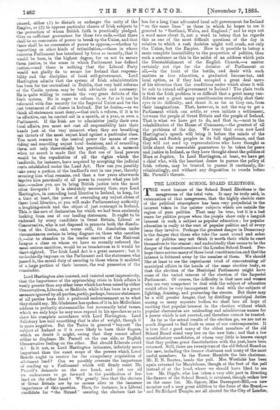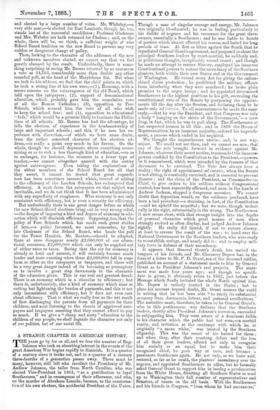THE LONDON SCHOOL BOARD ELECTIONS. T HE worst feature of the
School- Board. Elections is the meagreness of the total vote, It may be truly said, in extenuation of that meagreness, that the highly, electric state of the political atmosphere has• been very prejudicial to the interest taken in the• quieter subjects which are outside the region- of pure politics. That may be true, but it is' a bad omen for politics proper when the people show only a languid interest, in such a subject as popular education ; for popular education is really at the root of popular polities and of every, issue they involve. Perhaps the greatest danger in Democracy is- the danger that those who bake the most sound and sober view of polities. may nob think it worth their while to: exert themselves to the utmost; and undoubtedly that seems to be the danger of the constituencies of the London School Board. Per. haps then:rare-too many of these local constituencies, and thatthe interest is frittered away by. the number of them: We should like- at leash to see the experiment tried of concentrating all' municipal affairs in the hands of• the, same elective body, so that the election of the• Munioipal Parliament might have some of the varied interest of the election of the Imperial Parliament. Of coarse, the- difficulty is that men and women who• are very competent to deal with the subject of education would often be very incompetent• to deal with the subjects of lighting, draining, and- protecting the streets: But there. may be a still greater danger, that by dividing, municipal duties among so many separate• bodies, we shall lose all hope of exciting that popular interest in- the election- without which popular. electorates- are misleading- and mischievous names for a power which is not exerted, and therefore cannot be trusted.
As far as the actual results of the election go, we are not so much disposed to find fault as some of our contemporaries. It is true that a good many of the ablest members of the old School Board stand very low on the- new-lists; and that a few unsatisfactory candidates, of whom very- little is. known except that they profess great dissatisfaction with the past, have been returned. Still, there are twenty4wo of the old School Board on the new, including. the former chairman and many Hof the moat useful members. In the Tower Hamlets the late chairman, Mir. E. N. Buxton, heads the poll. Mre. Westlake has been again returned for Marylebone, though at the foot of the. poll instead of at the head, where we should have liked to see her. Mr. Diggle, who has• taken a very able part in directing the finance of the School Board, is returned; though rather low on the same- list. Mr. Spicer, Miss Davenport-Hill,--a new member and a very great addition to the force of the- Board,— and Sir Richard Temple, are all elected for the City of London,
and elected by a large number of votes. Mr. Whiteley,—a very able man,—is elected for East Lambeth, though he, too, stands last of the successful candidates ; Professor Gladstone and Mrs. Webster are both returned for Chelsea ; and, on the whole, there will be, we think, a sufficient weight of wise School Board tradition on the new Board to prevent any very sudden or dangerous change of policy.
Then, looking to the character of the addresses of the new and unknown members elected, we cannot say that we feel greatly alarmed by the result. Undoubtedly, there is some- thing surprising in seeing Mr. Barnes returned by so enormous a vote as 34,703, considerably more than double any other recorded poll, at the head of the Marylebone list. But when we look to his address, we find that the chief points on which he took a strong line of his own were,—(1), Economy, with a severe censure cn the extravagance of the old Board, which told upon the ratepayers ; (2), support of denominational education, which probably gave him the cumulative vote of all the Roman Catholics ; (3), opposition to Free Schools, which secured him the vote of all who wish to keep the school fees ; and (4), opposition to educational " fads," which would be a promise likely to fascinate the Philis- tines of all schools. Mr. Barnes has had the advantage, he tells the electors, of experience in the headmastership of large and important schools ; and this, if he uses his ex- perience with discretion,—of which we have some doubt, from the rather conceited character of his election ad- dress,—is really a point very much in his favour. On the whole, though we should deprecate above everything econo- mising so as to risk a less thorough kind of education,—so as to endanger, for instance, the recourse to a lower type of teacher,—we cannot altogether quarrel with the outcry against extravagance. Even taking the explanations of the ablest members of the School Board for all that they assert, it cannot be denied that great expendi- ture has been sometimes incurred which, instead of adding to the efficiency of the London Schools, has endangered that efficiency. A snub from the ratepayers on that subject was inevitable, and we do not think that it has been administered with any superfluity of roughness. Wise economy is not only consistent with efficiency, but is even a security for efficiency.
But undoubtedly there is one great danger before us which the new School-Board elections bring out in very strong relief, —the danger of imposing a kind and degree of economy in edu- cation which will diminish efficiency. Supposing, too, that the policy of Free Schools which has made such great strides of late,—a policy favoured, we must remember, by the late Chairman of the School Board, who heads the poll for the Tower Hamlets, Mr. Buxton,—should be adopted, there at once disappear nearly £2,000,000 of our educa- tional resources, £2,000,000 which can only be supplied out of either rates or taxes. Seeing that the cry for economy is already so loud and earnest, it will certainly become much louder and more exacting when these £2,000,000 fall in some form or other on the ratepayers or taxpayers, and there will be a very great danger indeed of its becoming so peremptory as to involve a great step downwards in the character of the education given. This is our real and greatest dread. There is an economy which is a stimulus to efficiency ; but there is, unfortunately, also a kind of economy which aims at nothing but lightening the burden of payments, and this is not only inconsistent with efficiency, but it does not even care about efficiency. That is what we really fear as the net result of first discharging the parents from all payments for their children, and next listening to the shouts of aggrieved rate- payers and taxpayers asserting that they cannot afford to pay so much. If we give a " cheap and nasty " education to the children of our people, we shall degrade the character not only of our politics, but of our social life.















































 Previous page
Previous page